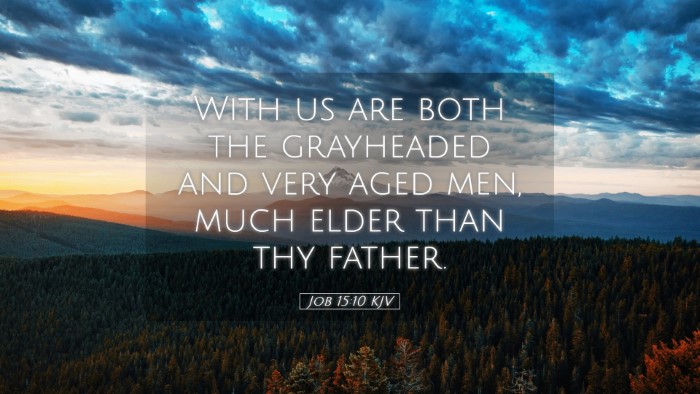Commentary on Job 15:10
Verse: Job 15:10 - "With us are both the gray-headed and the very aged men, much elder than thy father."
Introduction
The Book of Job presents a profound exploration of suffering, justice, and the nature of God. Within it, Job’s dialogues with his friends reveal deep theological insights, emotional struggles, and the human condition in the face of inexplicable pain. Job 15:10 offers a noteworthy statement about age and wisdom that invites careful examination.
Contextual Analysis
The context of this verse arises during a response by Eliphaz the Temanite, one of Job’s friends. Eliphaz accuses Job of uttering empty words in his distress and attempts to uphold a traditional view of divine justice. The mention of elder individuals highlights a theme of experience and wisdom, often equated with righteousness in ancient Near Eastern thought.
Commentary Insights
-
Matthew Henry:
Matthew Henry emphasizes the folly of Job’s assertions, suggesting that he speaks from ignorance. He presents a critical view of Job's plight, indicating that the aged provide a council grounded in experience. Age is seen as a marker of wisdom, and Henry warns against the impetuosity of youth, asserting that the council of elders carries weight.
-
Albert Barnes:
Albert Barnes elaborates on the implications of older generations offering wisdom. He interprets Eliphaz's statement as an appeal to the collective wisdom of those who have witnessed God's dealings throughout history. Barnes draws attention to the idea that the aged possess insights into divine justice and morality that should not be dismissed lightly by the younger, suffering Job.
-
Adam Clarke:
Adam Clarke provides a more nuanced interpretation, recognizing the cultural weight of age in offering counsel. He contests that while age often brings wisdom, not all older men provide true insight into God’s ways. Clarke presents the idea that human wisdom, regardless of age, is limited, particularly when it comes to understanding divine will in the context of human suffering.
Theological Implications
This verse raises crucial questions about the relationship between human experience and divine justice. The presupposition that age equals understanding of moral truth is indeed compelling but invites scrutiny. In theological discussions, the assumption that elder wisdom naturally aligns with divine understanding must be critically examined, particularly in light of Job's innocent suffering.
Wisdom vs. Knowledge
The commentary collectively suggests distinguishing between wisdom as experienced and knowledge as learned. Eliphaz’s claim hints at a form of societal wisdom that might not necessarily align with God’s reality. Such discernment remains relevant for pastors and theologians, especially in counseling contexts where traditional wisdom might obscure the redemptive narratives found in suffering.
Human vs. Divine Perception
The interplay between human perception of wisdom and God's omniscient plan illustrates a key conflict in the discourse between Job and his friends. Each character's understanding of God’s justice is shaped by their experiences, raising the necessity for reliance on divine revelation rather than human interpretation.
Pastoral Applications
For pastors and leaders, Job 15:10 serves as a poignant reminder of the imperative to engage with congregational questions about suffering and divine justice critically. Pastoral care should involve both respect for the wisdom of tradition and an openness to the struggles of faith expressed by individuals.
Listening to Suffering
-
Acknowledge Different Perspectives: Recognizing that every individual brings a unique understanding shaped by personal experience can foster a more compassionate community.
-
Encourage Dialogue: Open discussions about suffering and doubt can empower those who suffer, creating an environment where inquiry and faith coexist.
-
Bridge Between Generations: Pastors should facilitate intergenerational dialogue that honors the experience of the elderly while validating the experiences of younger individuals.
-
Emphasize Scripture’s Authority: Ultimately, wisdom must be discerned through Scripture rather than human traditions, leading to deeper engagements with God’s Word during times of distress.
-
Support Through Community: A community built on compassion, dedicated to processing suffering together under the guidance of Scripture, can provide a holistic approach to healing.
Conclusion
Job 15:10 invites deeper reflection on the nature of wisdom, suffering, and divine justice. It challenges both the aged and the young to recognize that while age may bring experience, true understanding of God’s ways requires more than human perception. Engaging with the insights of traditional commentary while allowing space for personal experience can enrich our theological understanding and pastoral care.


